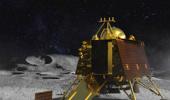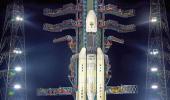The entire engine, Agnilet, is one piece of hardware from start to finish and has zero assembled parts.
T E Narasimhan reports.

Agnikul Cosmos, theIndian aerospace start-up, has become the world's first company to test a single piece, fully 3D printed rocket engine.
The Chennai-based manufacturer, which is developing the country's first private small satellite launch vehicle, Agnibaan, has successfully fired its higher-stage semi-cryogenic engine, which it calls Agnilet.
This is a unique rocket engine because it is completely 3D printed as a single component, in one run of the printer.
This goes to prove the efficacy of Agni's engineering architecture behind its orbital class vehicle Agnibaan's propulsion systems, said the IIT Madras incubated start-up.
Agnibaan, the rocket, will be capable of carrying up to 100 kg of payload to low Earth orbits up to 700 km with a plug-and-play engine configuration.
Its entire engine, Agnilet, is one piece of hardware from start to finish and has zero assembled parts.
"We don't think anyone in the world has ever pushed 3D printing of a rocket engine to this extent, and we couldn't be happier to have conceived, designed, realised and test fired this engine fully in India," said Srinath Ravichandran, CEO and co-founder, Agnikul Cosmos.
Rocket engines usually have hundreds of parts -- injectors to inject fuel into the engine; cooling channels to cool the engine; the igniter for the propellants, and so on. Agnilet was designed in such a manner so as to encapsulate all of these into just one piece of hardware. This automates the making of an entire engine, said Ravichandran.
"From Agnikul's operations standpoint, we are relieved that we would not have to track or manufacture numerous parts to realise a rocket engine from now on," said Moin SPM, co-founder and COO. Agnikul Cosmos.
"All that remains after printing is bare minimum post processing after which the engine can directly be assembled in our launch vehicle," Moin added.
Agnikul, which was founded in 2017, has been testing engines at a smaller scale, or those that were not 100 per cent additively manufactured, since September 2018.
This is the first time the company has demonstrated firing of a semi-cryogenic fully 3D printed rocket engine.











